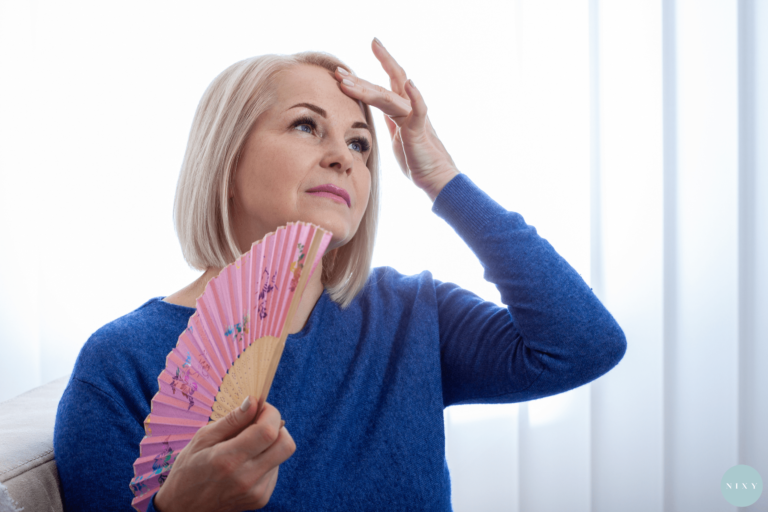
What is menopause?
Menopause is a natural biological process that marks the end of a woman’s reproductive years. It is defined as the cessation of menstrual periods for at least 12 consecutive months, typically occurring between the ages of 45 and 55. Menopause is a normal part of aging and is caused by a decline in the production of reproductive hormones, particularly estrogen and progesterone, by the ovaries.
During the years leading up to menopause, known as perimenopause, a woman may experience various symptoms as her hormone levels fluctuate. These symptoms can include irregular periods, hot flashes, night sweats, vaginal dryness, mood swings, sleep disturbances, and changes in libido. Not all women experience these symptoms, and their severity can vary.
Once a woman has gone through menopause and has not had a menstrual period for a year, she is considered postmenopausal. At this stage, hormone levels stabilize at lower levels, and many of the symptoms experienced during perimenopause begin to diminish. However, it’s important to note that menopause does not signify the end of a woman’s health or vitality; it simply marks a transition to a new phase of life.
While menopause is a natural process, its hormonal changes can increase the risk of certain health conditions. These include osteoporosis (reduced bone density), heart disease, and changes in cholesterol levels. Therefore, it’s important for women to take steps to maintain their overall health during and after menopause, including regular exercise, a healthy diet, and appropriate medical screenings.
It’s worth mentioning that menopause is specific to women. Men do not experience a natural equivalent to menopause, although their hormone levels may decline gradually with age.
Premature and early menopause
Premature menopause and early menopause are two conditions that involve the onset of menopause at a younger age than usual.
Premature Menopause: Premature menopause, also known as premature ovarian insufficiency (POI) or premature ovarian failure (POF), refers to the onset of menopause before the age of 40. In this condition, the ovaries stop functioning normally, leading to a significant decrease in estrogen production and fertility. The cause of premature menopause can vary and may include genetic factors, autoimmune disorders, certain medical treatments (such as chemotherapy or radiation therapy), ovarian surgery, or unknown causes in some cases. Women with premature menopause often experience symptoms similar to those of natural menopause, such as hot flashes, night sweats, vaginal dryness, and mood changes. Treatment options may include hormone replacement therapy (HRT) to manage symptoms and reduce the risk of long-term health issues associated with estrogen deficiency.
Early Menopause: Early menopause refers to menopause that occurs between the ages of 40 and 45, which is earlier than the average age range. It can occur naturally or be influenced by various factors, such as genetics, smoking, certain medical conditions (such as autoimmune disorders or chromosomal abnormalities), and medical treatments. The symptoms and management options for early menopause are similar to those of natural menopause and may include hormone replacement therapy and lifestyle modifications to support overall health.
Both premature and early menopause can have significant emotional and physical impacts on women. It is important for affected women to consult with healthcare professionals for proper diagnosis, management of symptoms, and support.
Emotional effects of the menopause
Menopause can bring about a range of emotional effects due to the hormonal changes and associated physical symptoms that women may experience. The emotional effects can vary in intensity and duration for each individual. Some common emotional effects of menopause include:
Mood swings: Fluctuations in hormone levels can contribute to mood swings, irritability, and increased sensitivity to stress. Women may find themselves experiencing sudden mood changes, feeling more easily overwhelmed, or having difficulty managing their emotions.
Anxiety and/or depression: Some women may experience increased feelings of anxiety, depression, or a general sense of unease during menopause. Hormonal changes can affect neurotransmitters in the brain that regulate mood, leading to emotional shifts. Additionally, other factors such as physical symptoms, sleep disturbances, and life changes associated with menopause can contribute to these feelings.
Fatigue and low energy: Menopausal symptoms like night sweats and sleep disturbances can result in fatigue and low energy levels, which can impact a woman’s emotional well-being. Chronic fatigue can also contribute to feelings of irritability, frustration, and mood changes.
Decreased self-esteem: The physical changes that often accompany menopause, such as weight gain, changes in body shape, and skin changes, can affect a woman’s self-esteem. Some women may struggle with accepting and adjusting to these changes, leading to feelings of self-consciousness, lowered self-confidence, and mood disturbances.
Memory and concentration issues: Some women may experience difficulty with memory and concentration during menopause, often referred to as “brain fog.” These cognitive changes can lead to frustration, anxiety, and a sense of decreased mental sharpness, affecting emotional well-being.
It’s important to note that not all women will experience the same emotional effects, and individual experiences can vary. If the emotional effects of menopause become severe or significantly impact a woman’s daily life and well-being, it is advisable to seek support from healthcare professionals, who can provide appropriate guidance, and counseling, or recommend suitable treatment options.
Staying healthy during and after the menopause
Staying healthy during and after menopause is crucial for maintaining overall well-being and managing the potential health risks associated with hormonal changes. Here are some key aspects to focus on:
Healthy diet: Adopting a balanced and nutritious diet can help support your overall health during and after menopause. Include a variety of fruits, vegetables, whole grains, lean proteins, and healthy fats in your meals. Consider increasing your calcium intake to support bone health, and ensure an adequate intake of vitamin D. Limit your consumption of processed foods, sugary snacks, and excessive caffeine and alcohol, as they can exacerbate certain menopausal symptoms.
Regular exercise: Engaging in regular physical activity offers numerous benefits during menopause, including managing weight, improving mood, reducing the risk of chronic diseases (such as heart disease and osteoporosis), and enhancing overall well-being. Aim for at least 150 minutes of moderate-intensity aerobic exercise per week, along with strength training exercises that target major muscle groups.
Bone health: Estrogen decline during menopause increases the risk of osteoporosis and bone fractures. To maintain strong bones, ensure an adequate intake of calcium and vitamin D through diet or supplements, engage in weight-bearing exercises (such as walking or weightlifting), and avoid smoking and excessive alcohol consumption.
Heart health: The risk of heart disease increases after menopause. To maintain heart health, follow a heart-healthy diet low in saturated and trans fats, engage in regular aerobic exercise, maintain a healthy weight, manage stress levels, and get regular check-ups to monitor blood pressure, cholesterol, and other cardiovascular risk factors.
Manage menopausal symptoms: If you experience bothersome menopausal symptoms such as hot flashes, night sweats, or vaginal dryness, consult with your healthcare provider. They can recommend various treatment options, including hormone replacement therapy (HRT) or non-hormonal alternatives, to alleviate symptoms and improve your quality of life.
Emotional well-being: Menopause can impact emotional health. Prioritize self-care, engage in stress-reducing activities (such as meditation or yoga), maintain a strong support network, and seek professional help if needed to manage emotional challenges.
Regular health check-ups: Attend regular check-ups with your healthcare provider to monitor your overall health, manage any chronic conditions, and receive appropriate screenings and preventive care.
Remember, every woman’s experience during and after menopause is unique. It’s essential to listen to your body, seek professional advice when needed, and make choices that promote your physical and emotional well-being during this phase of life.
Find out more about NIXY here, and start empowering women in your organisation today.
